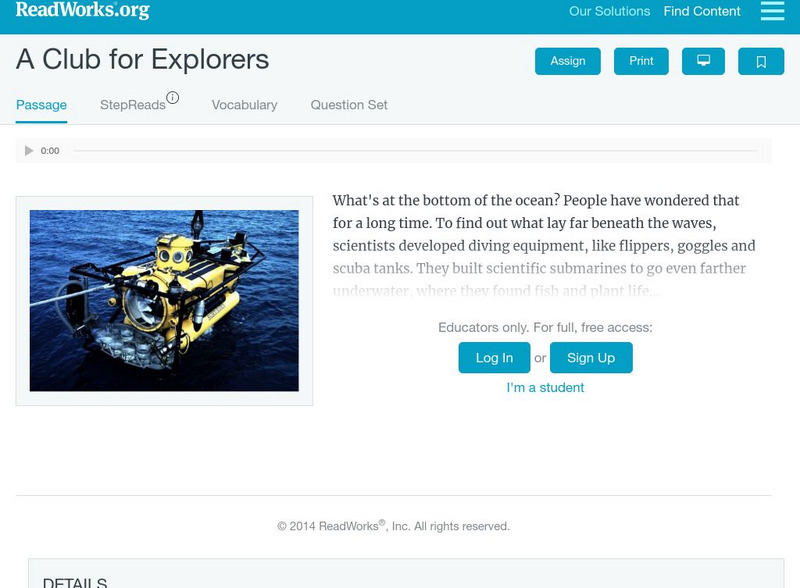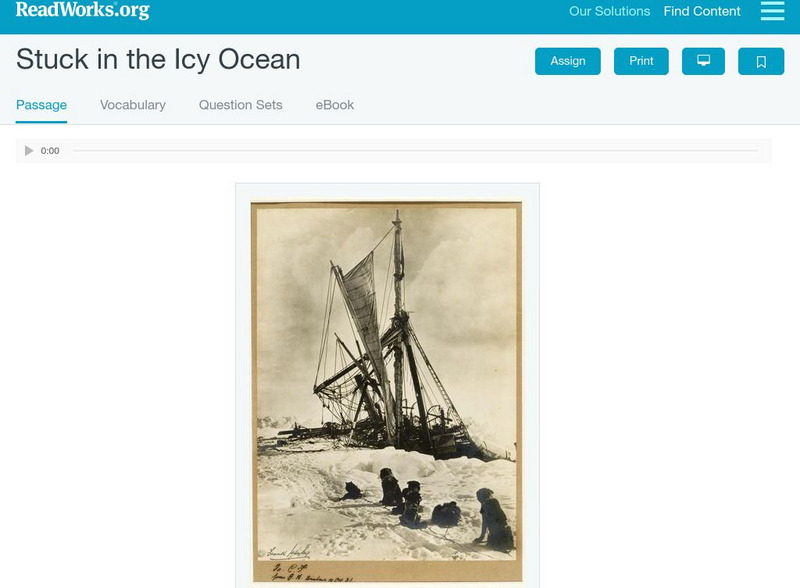Hi, what do you want to do?
Other
Young Ocean Explorers
This amazing website brings the ocean direct to your computer with high-quality, fact-filled videos. Articles answer everything you ever wanted to know about the ocean.
NOAA
Noaa: Ocean Explorer: Hot, Cold, Fresh and Salty
Students simulate ocean water characteristics in order to recognize that the effects of salinity and temperature are the drivers of thermohaline circulation.
National Geographic
National Geographic: Geostories: Voyages Across the Ocean
Use this GeoStory in formal or informal instruction to provide information about the voyages of numerous historical navigators and explorers. This GeoStory helps students understand the importance of ocean exploration in contributing to...
NOAA
Noaa: Ship Okeanos Explorer: "America's Ship for Ocean Exploration"
Follow teams of scientists as they explore marine life and habitats of the deep ocean. Covers past and current expeditions in various regions of the world. Includes webcasts, videos, lesson plans and modules, and career resources. An...
NOAA
Noaa: Ocean Explorer: Off Base Acidity of Oceans
A student inquiry into properties of the ocean's carbonate buffer system, and how changes in atmospheric carbon dioxide levels may affect ocean pH and biological organisms that depend on calcification.
NOAA
Noaa: Ocean Explorer: Sea Floor
This resource page has numerous links to pictures and videos of the sea floor. Topics include geologic features, habitats, bacteria mats and hydrates.
NOAA
Noaa: Ocean Explorer: Thunder Bay Sinkholes 2008: Cells That Changed the World [Pdf]
A class experiment on cyanobacteria and green algae. The lesson is based on research conducted during a 2008 expedition to study sinkholes in the waters near Thunder Bay, Ontario. An annotated list of websites with source materials and...
Read Works
Read Works: A Club for Explorers
[Free Registration/Login Required] An informational text about scientists who explore the ocean. A question sheet is available to help students build skills in reading comprehension.
TED Talks
Ted: Ted Ed: How Did Polynesian Wayfinders Navigate the Pacific Ocean?
Imagine setting sail from Hawaii in a canoe. Your target is a small island thousands of kilometers away in the middle of the Pacific Ocean. For thousands of years, Polynesian navigators managed voyages like this without the help of...
NOAA
Noaa: Ocean Explorer: Krill in National Marine Sanctuary
An overview from Ocean Explorer of the the marine crustacean, Krill. Includes info about life cycle, habitat, behavior, environmental importance and images.
NOAA
Noaa: Ocean Explorer: Aerial Photography & Mapping Lesson Plan: Images of Katrina
This activity from NOAA Ocean Service is about using aerial photographs to assess the impact of extreme weather events such as Hurricane Katrina. The activity features aerial views of Biloxi, MS post-Katrina and enables students to see...
Polk Brothers Foundation Center for Urban Education at DePaul University
De Paul University: Center for Urban Education: American Explorers [Pdf]
"American Explorers" is a one page, non-fiction, reading passage about the Lewis and Clark Expedition. They traveled from St. Louis to the Pacific Ocean with the help of Native Americans and made maps along the way. It is followed by...
Polk Brothers Foundation Center for Urban Education at DePaul University
De Paul University: Center for Urban Education: American Explorers [Pdf]
"American Explorers" is a one page, non-fiction, reading passage about the Lewis and Clark Expedition from St. Louis to the Pacific Ocean. Along the way they drew maps for future travels. It is followed by constructed-response questions...
Read Works
Read Works: Stuck in the Icy Ocean by Kate Paixao
[Free Registration/Login Required] This passage is about Ernest Shackleton's expedition to Antarctica, the problems he faced, and how he solved them. A comprehension question set and vocabulary information for the words courage, rescue,...
NOAA
Noaa: Ocean Explorer: The Methane Circus
For this activity students will understand the events occuring during the Cambrian explosion. They will also begin to explain how methane hydrates contribute to global warming. Finally, they will discuss links between methane hydrates...
NOAA
Noaa: Ocean Explorer: Keeping Watch on Coral Reefs
Students read coral reef tutorials, describe the role of satellites, analyze oceanographic data, and identify actions to reduce threats to these fragile ecosystems. Their goal is to ultimately produce a public education program about...
Scholastic
Scholastic Explorers: Ocean Life
This lesson plan explores how human activity has an impact on turtles, sea otters, and dolphins in different parts of the world. Your young scholars will read field reports from the sites and evaluate data that is offered.
Science Education Resource Center at Carleton College
Serc: All That Glitters
This Ocean Explorer lesson plan (PDF) explores the questions: What colors, if any, are visible down in the deep sea? What is bioluminescence? Young scholars will learn about white light (visible light), the quantity and quality of light...
Other
Voyages: Scientific Circumnavigations: Dampier
Read about the unlikely journals and observations of William Dampier, an English pirate who sailed the Pacific, making landfall in the Philippines, East Indies, and Australia. See his maps, descriptions of the Pacific, and observations...
Enchanted Learning
Enchanted Learning: Zoom School: Africa
What continent is bordered by the Atlantic Ocean, Indian Ocean, Red Sea, and the Mediterranean Sea? Click here and find out. Explore art, animals, flags, crafts, explorers, geography, and more to learn about Africa.
Enchanted Learning
Enchanted Learning: Zoom School: Uk of Great Britain and Northern Ireland
Use this site to explore the United Kingdom. Learn about the UK's flag, geography, map, explorers, animals, scientists, explorers and more.
A&E Television
History.com: Vasco Nunez De Balboa
A short biography of Vasco Nunez de Balboa, a Spanish explorer, who is credited with sighting the Pacific Ocean while crossing the isthmus of Panama.





















